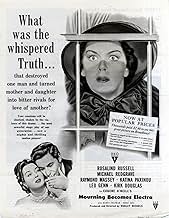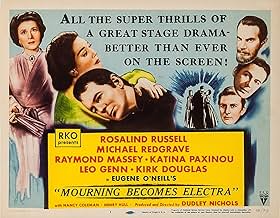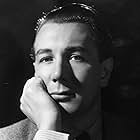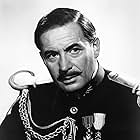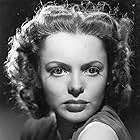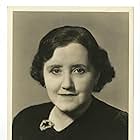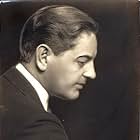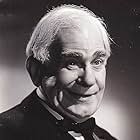IMDb RATING
6.3/10
1.4K
YOUR RATING
Eugene O'Neill's updated version of the Oresteia set in New England, after the American Civil War.Eugene O'Neill's updated version of the Oresteia set in New England, after the American Civil War.Eugene O'Neill's updated version of the Oresteia set in New England, after the American Civil War.
- Nominated for 2 Oscars
- 2 wins & 2 nominations total
- Director
- Writers
- All cast & crew
- Production, box office & more at IMDbPro
Storyline
Did you know
- TriviaRosalind Russell received an Academy Award nomination for her role as Lavinia in this movie. Apparently, she was so sure she was going to win that when the winner was about to be announced, she had risen from her seat to accept it... only to discover that Loretta Young had won for her performance in The Farmer's Daughter (1947).
- GoofsWhile Adam Brandt stands by the bench where Lavinia is seated, he holds his hat by his side and then drops it on the ground. Instead of hastily picking it up and putting it on the bench next to him as he sits down, he seems to forget about it and leaves it on the ground after sitting down to talk to her.
- Quotes
Orin Mannon: You folks at home take death so solemnly. You have to learn to mock or go crazy.
- Alternate versionsThis is (unfortunately) usually shown on television in a heavily cut 105-minute version. The 159-minute UK version can sometimes be seen on Turner Classic Movies.
- ConnectionsReferenced in A Southern Yankee (1948)
- SoundtracksOh Shenandoah
(uncredited)
Traditional sea chantey
Sung over credits and throughout film by unidentified male chorus
Featured review
Most of the professional reviews of this unjustly neglected film dismiss it as "stagy", "wordy", and "dull". Yes, it is wordy, if you consider a film entirely propelled by dialogue wordy, and yes, it is stagy if you consider a film largely confined to a single set stagy, with no fancy cutting, camera tricks, or quick editing to disturb or interrupt the flow of language. And yes, at nearly three hours, it is one of the longest film versions of a classic Eugene O'Neill play ever made. (The original play clocks in at six hours!)
I myself have never been able to understand those critics who claim to appreciate great achievements in film and theatre, and yet grow restless at the thought of too much dialogue in a film. Who cares, when the dialogue is written by one of the greatest playwrights this country has produced, and when the storyline is as riveting as this?
O'Neill never actually wrote a suspense drama, but this updated revision of the Electra-Orestes-Agamemnon myth is as close as he ever came to it. The story features elements of murder, revenge, insanity, and more than a hint of incest, and when Rosalind Russell as Lavinia and Michael Redgrave as Orin, her beloved brother, plot together to carry out their scheme, the story becomes as gripping as any suspense film ever made.
There are very few completely calm moments in this film; nearly all of the performances take on a quality of seeming to be on the verge of a total nervous collapse. Some of Rosalind Russell's acting, particularly during the first hour or so, may strike you as slightly over-the-top, especially her facial expression (accompanied by an ominous musical chord) when she sees her thoroughly evil mother Christine (Katina Paxinou) in a lover's clinch with Adam Brant (Leo Genn), an illegitimate relative of the Mannon family, while Christine's husband (Raymond Massey) is off fighting the Civil War, but once Russell becomes the cold, scheming avenger, she is magnificent. Michael Redgrave is slightly uncomfortable with his attempt an an American accent, but he effectively conveys the essential goodness of a conscience-stricken young man on the verge of madness who only wants to do the right thing. Katina Paxinou is despicably nasty and self-dramatizing as the utterly selfish Christine Mannon. Raymond Massey ,so often cast as a villain, gives what is one of the best, most dignified and most restrained performances of his career as Ezra Mannon, head of the family, a man who is supposedly unfeeling and callous (according to Paxinou's character, but then, can we trust her?), but who in the story reveals only a genuinely sympathetic and tragic side of himself. Leo Genn is sincere as Christine's misguided and basically kind lover, and Kirk Douglas, in one of his first film roles, plays Lavinia's bewildered and decent suitor.
Because of the film's disastrous reception at the box office, a barbaric decision was made to cut an entire hour by simply lopping off the entire final section, unnecessarily mutilating a film that deserves to take its place as one of the great dramatic stage-to-film adaptations of all time, and certainly one of the few great film adaptations of a Eugene O'Neill play. His plays, on the whole, have been frequently distorted and/or mutilated for the big screen, unlike Tennessee Williams's, whose works made it relatively unscathed, and even sometimes improved, to film. O'Neill's plays have not fared as well on film as they have on television, but along with 1962's "Long Day's Journey Into Night", and 1940's "The Long Voyage Home", "Mourning Becomes Electra" can be rightfully considered a film classic.
I myself have never been able to understand those critics who claim to appreciate great achievements in film and theatre, and yet grow restless at the thought of too much dialogue in a film. Who cares, when the dialogue is written by one of the greatest playwrights this country has produced, and when the storyline is as riveting as this?
O'Neill never actually wrote a suspense drama, but this updated revision of the Electra-Orestes-Agamemnon myth is as close as he ever came to it. The story features elements of murder, revenge, insanity, and more than a hint of incest, and when Rosalind Russell as Lavinia and Michael Redgrave as Orin, her beloved brother, plot together to carry out their scheme, the story becomes as gripping as any suspense film ever made.
There are very few completely calm moments in this film; nearly all of the performances take on a quality of seeming to be on the verge of a total nervous collapse. Some of Rosalind Russell's acting, particularly during the first hour or so, may strike you as slightly over-the-top, especially her facial expression (accompanied by an ominous musical chord) when she sees her thoroughly evil mother Christine (Katina Paxinou) in a lover's clinch with Adam Brant (Leo Genn), an illegitimate relative of the Mannon family, while Christine's husband (Raymond Massey) is off fighting the Civil War, but once Russell becomes the cold, scheming avenger, she is magnificent. Michael Redgrave is slightly uncomfortable with his attempt an an American accent, but he effectively conveys the essential goodness of a conscience-stricken young man on the verge of madness who only wants to do the right thing. Katina Paxinou is despicably nasty and self-dramatizing as the utterly selfish Christine Mannon. Raymond Massey ,so often cast as a villain, gives what is one of the best, most dignified and most restrained performances of his career as Ezra Mannon, head of the family, a man who is supposedly unfeeling and callous (according to Paxinou's character, but then, can we trust her?), but who in the story reveals only a genuinely sympathetic and tragic side of himself. Leo Genn is sincere as Christine's misguided and basically kind lover, and Kirk Douglas, in one of his first film roles, plays Lavinia's bewildered and decent suitor.
Because of the film's disastrous reception at the box office, a barbaric decision was made to cut an entire hour by simply lopping off the entire final section, unnecessarily mutilating a film that deserves to take its place as one of the great dramatic stage-to-film adaptations of all time, and certainly one of the few great film adaptations of a Eugene O'Neill play. His plays, on the whole, have been frequently distorted and/or mutilated for the big screen, unlike Tennessee Williams's, whose works made it relatively unscathed, and even sometimes improved, to film. O'Neill's plays have not fared as well on film as they have on television, but along with 1962's "Long Day's Journey Into Night", and 1940's "The Long Voyage Home", "Mourning Becomes Electra" can be rightfully considered a film classic.
- How long is Mourning Becomes Electra?Powered by Alexa
Details
- Release date
- Country of origin
- Language
- Also known as
- Eugene O'Neill's Mourning Becomes Electra
- Filming locations
- Production companies
- See more company credits at IMDbPro
Box office
- Budget
- $2,342,000 (estimated)
- Runtime2 hours 39 minutes
- Color
- Aspect ratio
- 1.37 : 1
Contribute to this page
Suggest an edit or add missing content

Top Gap
By what name was Mourning Becomes Electra (1947) officially released in India in English?
Answer



